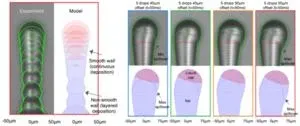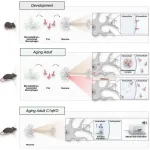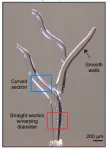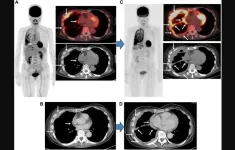(Press-News.org) The Associate Dean of Research at the University of Tennessee Health Science Center’s College of Nursing has received a two-year, $421,188 grant from the National Institutes of Health (NIH) to improve cognitive screening in people who suffer from a devastating type of stroke called aneurysmal subarachnoid hemorrhage (aSAH).
Professor Ansley Stanfill, PhD, RN, FAAN, has devoted her program of research to improving outcomes for people who survive strokes. Her latest grant aims to determine if an existing screening tool can be used in a new way to assess patients following aSAH and trigger a referral to an in-depth neuropsychological assessment, which could lead to earlier effective interventions.
“Over the last 20 years we have done a much better job of saving people. But there is always the question, ‘What are we saving them to?’” Dr. Stanfill said. “My goal is to return them to a good quality of life and to ameliorate their symptoms.”
The aSAH type of stroke strikes relatively young people, carrying a mortality rate of almost 40 percent. About 30 percent of those who do survive will experience severe long-term disability, and many survivors experience cognitive symptoms. A higher incidence of cognitive issues following such a stroke is seen in rural or African-American patients, Dr. Stanfill said. It is hoped that the study could make a significant impact on improving equity by informing new practice guidelines that provide an earlier and more accurate assessment of cognitive issues.
In the study’s pilot data, cognitive problems went undetected in about 67% of patients because they were not picked up by typical outpatient clinical neurological exams, Dr. Stanfill said. Patients who survive aSAH can be affected at the level of executive function in cognition, which includes some of the everyday skills needed to make plans or solve problems. Dr. Stanfill gave the example of an accountant who could still do his job but was frustrated that he could not add numbers in his head anymore.
The study will enroll 60 aSAH patients over 18 months as they seek outpatient follow-up care at Semmes Murphey Clinic. The researchers will also be collecting information from someone who lives with or is close to the patient to determine if they report different cognitive issues than the patient does.
Dr. Stanfill will serve as Principal Investigator on this grant and will be supported by Co-Investigators Assistant Professor Brandon Baughman, PhD, in the Department of Neurosurgery, and Associate Professor Xueyuan Cao, PhD, and Research Manager Drew Prescott, MHIM, both in the College of Nursing.
“I have been wanting to do this project for a long time,” Dr. Stanfill said. “This is all building toward my goal of improving physical, affective, and cognitive outcomes for people who suffer a stroke.” In 2018, she received a $1.1 million NIH grant to study how social, clinical, and genetic factors affect a person’s risk for developing severe disability after subarachnoid hemorrhage, aiming to also give insight into the disparities for this outcome seen between Caucasian and African-American patients.
END
National Institutes of Health grant could mean progress toward improved outcomes for stroke patients
2024-07-15
ELSE PRESS RELEASES FROM THIS DATE:
SfN establishes James L. Roberts Endowed Fund
2024-07-15
Washington, D.C. – The Society for Neuroscience (SfN) has received $128,000 from the estate of James L. Roberts, PhD. With the funds, SfN Council voted to create a new long-term endowed fund, The James L. Roberts Fund, and will use the income from its investments to create and perpetually fund James L. Roberts Trainee Professional Development Awards (TPDAs) beginning at Neuroscience 2024.
“I knew Jimmy Roberts very well. We basically launched neurobiology at Sinai when we co-directed the Fishberg Research Center for Neurobiology at Mount Sinai from 1989–2002,” said incoming SfN President John Morrison. “Jimmy was an outstanding ...
Unlocking the mystery of preexisting drug resistance: New study sheds light on cancer evolution
2024-07-15
CLEVELAND—The evolution of resistance to diseases, from infectious illnesses to cancers, poses a formidable challenge.
Despite the expectation that resistance-conferring mutations would dwindle in the absence of treatment due to a reduced growth rate, preexisting resistance is pervasive across diseases that evolve—like cancer and pathogens—defying conventional wisdom.
In cancer, it is well known that small numbers of drug-resistant cells likely exist in tumors even before they’re treated. In something of a paradox, before treatment, these mutants have been repeatedly shown to have lower fitness than the surrounding ancestor cells from which they arose. It leads ...
New study reveals critical role of C1q protein in neuronal function and aging
2024-07-15
BOSTON, Mass. (July 15, 2024)—A groundbreaking study conducted at the lab of Beth Stevens, PhD, at Boston Children’s Hospital has revealed that an immune protein impacts neuronal protein synthesis in the aging brain. Previous work from the Stevens lab had uncovered that immune cells in the central nervous system, microglia, help prune synapses in the developing brain by tagging synapses with the immune protein C1q. New research led by Nicole Scott-Hewitt, published in Cell, shows that neurons can also internalize C1q. C1q seems to influence protein production inside neurons by interacting with ribosomal proteins, RNA-binding proteins, and ...
New research demonstrates potential for increasing effectiveness of popular diabetes, weight-loss drugs
2024-07-15
A network of proteins found in the central nervous system could be harnessed to increase the effectiveness and reduce the side effects of popular diabetes and weight-loss drugs, according to new research from the University of Michigan.
The study, appearing today in the Journal of Clinical Investigation, focused on two proteins called melanocortin 3 and melanocortin 4 found primarily on the surface of neurons in the brain that play a central role in regulating feeding behavior and maintaining the body's energy balance.
Melanocortin ...
Understanding the 3D ice-printing process to create micro-scale structures
2024-07-15
Advances in 3D printing have enabled many applications across a variety of disciplines, including medicine, manufacturing, and energy. A range of different materials can be used to print both simple foundations and fine details, allowing for the creation of structures with tailored geometries.
However, creating structures with micro-scale, precise internal voids and channels still poses challenges. Scaffolds used in tissue engineering, for example, must contain a three-dimensional complex network of conduits that mimic the human vasculature. With traditional additive manufacturing, where the material is deposited layer ...
Children’s Hospital of Philadelphia researchers develop antioxidant strategy to address mitochondrial dysfunction caused by SARS-CoV-2 virus
2024-07-15
Philadelphia, July 15, 2024 – Building upon groundbreaking research demonstrating how the SARS-CoV-2 virus disrupts mitochondrial function in multiple organs, researchers from Children’s Hospital of Philadelphia (CHOP) demonstrated that mitochondrially-targeted antioxidants could reduce the effects of the virus while avoiding viral gene mutation resistance, a strategy that may be useful for treating other viruses. The preclinical findings were recently published in the journal Proceedings ...
How climate change is altering the Earth’s rotation
2024-07-15
Climate change is causing the ice masses in Greenland and Antarctica to melt. Water from the polar regions is flowing into the world’s oceans –and especially into the equatorial region. “This means that a shift in mass is taking place, and this is affecting the Earth’s rotation,” explains Benedikt Soja, Professor of Space Geodesy at the Department of Civil, Environmental and Geomatic Engineering at ETH Zurich.
“It’s like when a figure skater does a pirouette, first holding her arms close to her body and then stretching ...
Comparison of FDG-PET/CT and CT for treatment evaluation of patients with unresectable malignant pleural mesothelioma
2024-07-15
“FDG-PET is generally considered as a useful metabolic evaluation tool, while it is also thought to have an emerging role for assessment of systemic therapy response.”
BUFFALO, NY- July 15, 2024 – A new research paper was published in Oncotarget's Volume 15 on June 20, 2024, entitled, “Comparison of FDG-PET/CT and CT for evaluation of tumor response to nivolumab plus ipilimumab combination therapy and prognosis prediction in patients with unresectable malignant pleural mesothelioma.”
Malignant pleural mesothelioma (MPM) is an aggressive neoplasm and affected ...
New concept explains how tiny particles navigate water layers – with implications for marine conservation
2024-07-15
A new UBC study published recently in Proceedings of the National Academy of Science (PNAS) has unveiled insights into how microscopic organisms such as marine plankton move through water with different density layers.
Researchers Gwynn Elfring and Vaseem Shaik found that density layers, created by variations in temperature or salinity, influence the swimming direction and speed of tiny particles navigating a liquid.
Pushers and pullers
“There are two different types of microscopic swimmers – ...
New research shows a frictionless state can be achieved at macroscale
2024-07-15
UTICA, NY – The president of SUNY Polytechnic Institute (SUNY Poly), Dr. Winston “Wole” Soboyejo, and postdoctoral researcher, Dr. Tabiri Kwayie Asumadu, have published a revolutionary new paper titled, "Robust Macroscale Superlubricity on Carbon-Coated Metallic Surfaces." This paper explores an innovative approach to reducing friction on metallic surfaces – a significant advancement that could have major real-world impacts.
The study shows that superlubricity – a state with virtually no friction that was once believed to only be achievable at nanoscale – can now be maintained at macroscale for extended time ...






